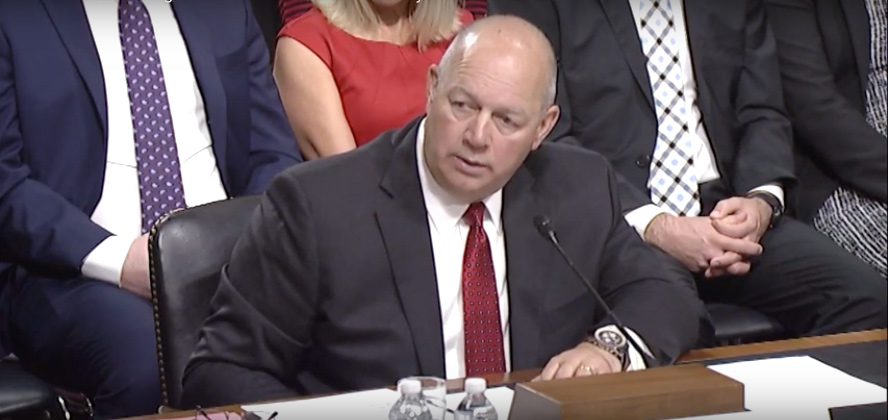Stay Up to Date
Submit your email address to receive the latest industry and Aerospace America news.
Former Delta Air Lines pilot and executive Stephen Dickson was confirmed today by the U.S. Senate for a five-year term as FAA administrator after a contentious confirmation process.
Dickson, the first permanent administrator of the FAA since January 2018, told lawmakers during his confirmation hearing that he would review the FAA certification process that has come under fire from lawmakers of both parties in the aftermath of the two Boeing 737 MAX crashes that killed 346 people.
Beyond the MAX situation, Democratic lawmakers raised a whistleblower retaliation case against Delta, where Dickson was in charge of flight operations until his retirement in October 2018.
The plaintiff, Delta pilot Karlene Petitt, alleges that Dickson improperly approved referring her for psychiatric evaluation after she raised concerns about “pilot fatigue, pilot training, pilot training records, and Delta’s Safety Management Systems” in 2016, according to a document posted online by Petitt’s lawyers.
Petitt was diagnosed with bipolar disorder by a Delta psychiatrist and grounded for 18 months. She was cleared by Delta to resume flying Boeing 777s in 2017 after a panel of psychiatrists determined the bipolar diagnosis was incorrect.
Questioned by lawmakers, Dickson defended his decision to refer Petitt to a Delta psychiatrist. He called it a “sound course of action” in an October 2018 deposition, according to a transcript released by Petitt’s lawyers. Democratic lawmakers criticized him for not disclosing the case in his nomination questionnaire to the Senate Committee on Commerce, Science and Transportation.
Sen. Maria Cantwell, D-Wash., ranking member of the Commerce Committee, was one of 40 “no” votes against Dickson, 39 of them Democrats, one Independent. Pointing to the Petitt case earlier this month, she said she would oppose Dickson’s nomination because his “oversight of these matters raises serious questions about his leadership.”
Tuesday on the Senate floor, Cantewell said Dickson “is not the right person for the safety culture that we need at the FAA,” according to a livestream.
Dickson assumes leadership at the FAA as the agency is working with Boeing to recertify its troubled automation software, the Maneuvering Characteristics Augmentation System, or MCAS. Accident investigators outside the U.S. have said that in the Lion Air and Ethiopian Airlines crashes, crews could not control the aircraft after MCAS activated itself because of faulty readings from angle-of-attack sensors that measure the angle between the aircraft and oncoming air flow. If the readings had been accurate, the planes would have been in danger of stalling, so MCAS forced the noses of the planes down.
Dickson told the Senate Commerce Committee in May he would review the certification process in which the FAA can delegate employees of private companies to sign off on parts of an aircraft’s design through its Organization Designation Authorization program. The FAA says ODA streamlines the certification process and that ODA does not amount to self-certification of aircraft.
“I’ll be a steady hand on the tiller, which I think is what the American public needs,” Dickson said, according to video of the hearing. “But that doesn’t mean that I’m not going to be asking the tough questions and making the changes that need to be made.”
Family members of the victims of the MAX crashes told lawmakers last week those changes should include mandatory simulator training on MCAS for pilots and a total recertification of the MAX design. Paul Njoroge, whose wife, three children and mother-in-law died in the Ethiopian Airlines crash, also called for a “full legislative fix for the aviation safety system.”
“The credibility of the U.S. aviation system, and perhaps Boeing itself, cannot survive a third crash,” Njoroge said.
About cat hofacker
Cat helps guide our coverage and keeps production of the print magazine on schedule. She became associate editor in 2021 after two years as our staff reporter. Cat joined us in 2019 after covering the 2018 congressional midterm elections as an intern for USA Today.
Related Posts
Stay Up to Date
Submit your email address to receive the latest industry and Aerospace America news.




